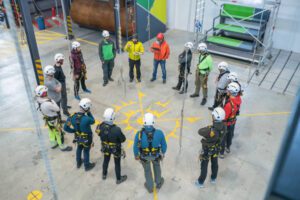
Hi Construction Nation,
Last week I was talking to a member of a project team on a project that is just starting, and they were concerned that they were bringing baggage with them from a previous project. They asked if I had any ideas on how to ensure that the old baggage did not define how the team worked together on their new project.
Our brains are wonderful projectors. The entire project team will bring with them the traumas from their past projects, especially with the people whom you are going to start working with again, and project it right into the present, and into your project’s future. You are right to be concerned that history will repeat itself. We do it all the time.
Besides your history, when a project team comes together, it is made up of dozens of different companies and organizations that form into a team-of-teams. Each company brings with it their own culture, their own experiences, their own interests. Plus, each company’s team is made up of unique people with their own unique personality, unique experiences, and unique abilities. The level of complexity is extreme and makes working together, communicating, and decision making very difficult.

We Hope Things Will Work Out
Because of this level of complexity we have on our projects, we can only “hope” that things work out. We hope that the team will be able to work together to work through the problems they face. But unfortunately for most projects it does not work out.
If your project team-of-teams does not form well and build a level of trust so they can trust enough to share the problems they see and the ideas they have for resolving those problems, then the team just can’t succeed.
The Most Critical Time is When Your Team is Forming
When your team-of-teams is forming is the critical time when you are setting the norms for how the team will behave during the project. If you don’t set norms of trust and collaboration, the team will not be able to become high performing.
Too often the norms of fear and protection get solidified as the team forms and this sets up the team for the dysfunctions, they will carry with them as the project plays out.

Team Joint Training Really Works
The Harvard Negotiation Program found that the best way to get a team to form is to have them go through training together so that they are all using the same frameworks, tools, have aligned expectations, and the same vocabulary. I’ve proven this hundreds of times over the years.
The International Partnering Institute now has three Project Leader Certification courses that provide any project team proven frameworks and tools by which to operate on their project. The three certification courses provide a proven strategy for forming well to develop trust and collaboration so your team can become high performing. Each course is designed to help your project team lead as high trust leaders who know how to create the norms of trust, collaboration, and cooperation, along with how to fully implement Collaborative Partnering on your project every day and negotiate high trust agreements.
Imagine how powerful joint training in Collaborative Partnering, Trusted Leadership, and Non-Adversarial Negotiation could be for your teams. If you want to register your team you can do so here.
Until Next Month Construction Nation,
Sue
Sue Dyer, MBA, MIPI is a Master Partnering Facilitator & Founder for OrgMetrics LLC, WSJ bestselling author on Trusted Leadership for construction leaders, Founder of the International Partnering Institute, and President of sudyco® LLC. You can contact Sue at suedyer@orgmet.com or 510 504-5877.


